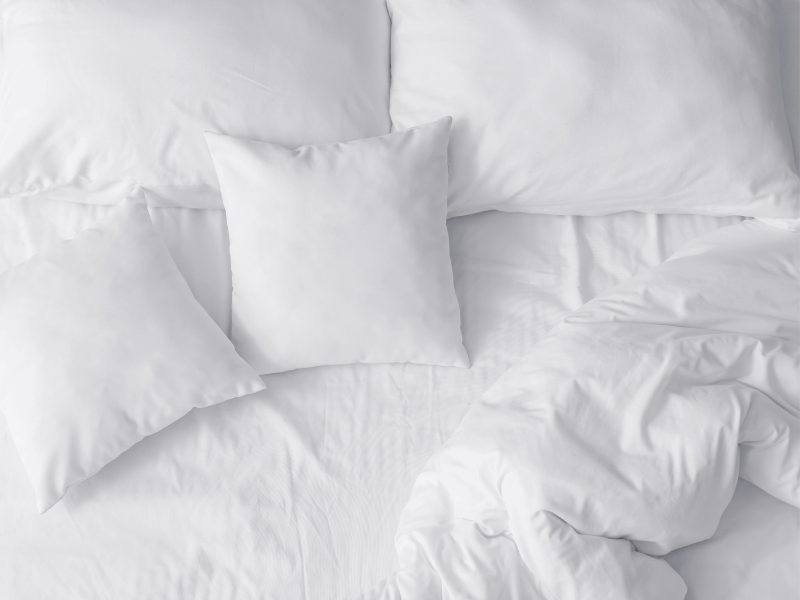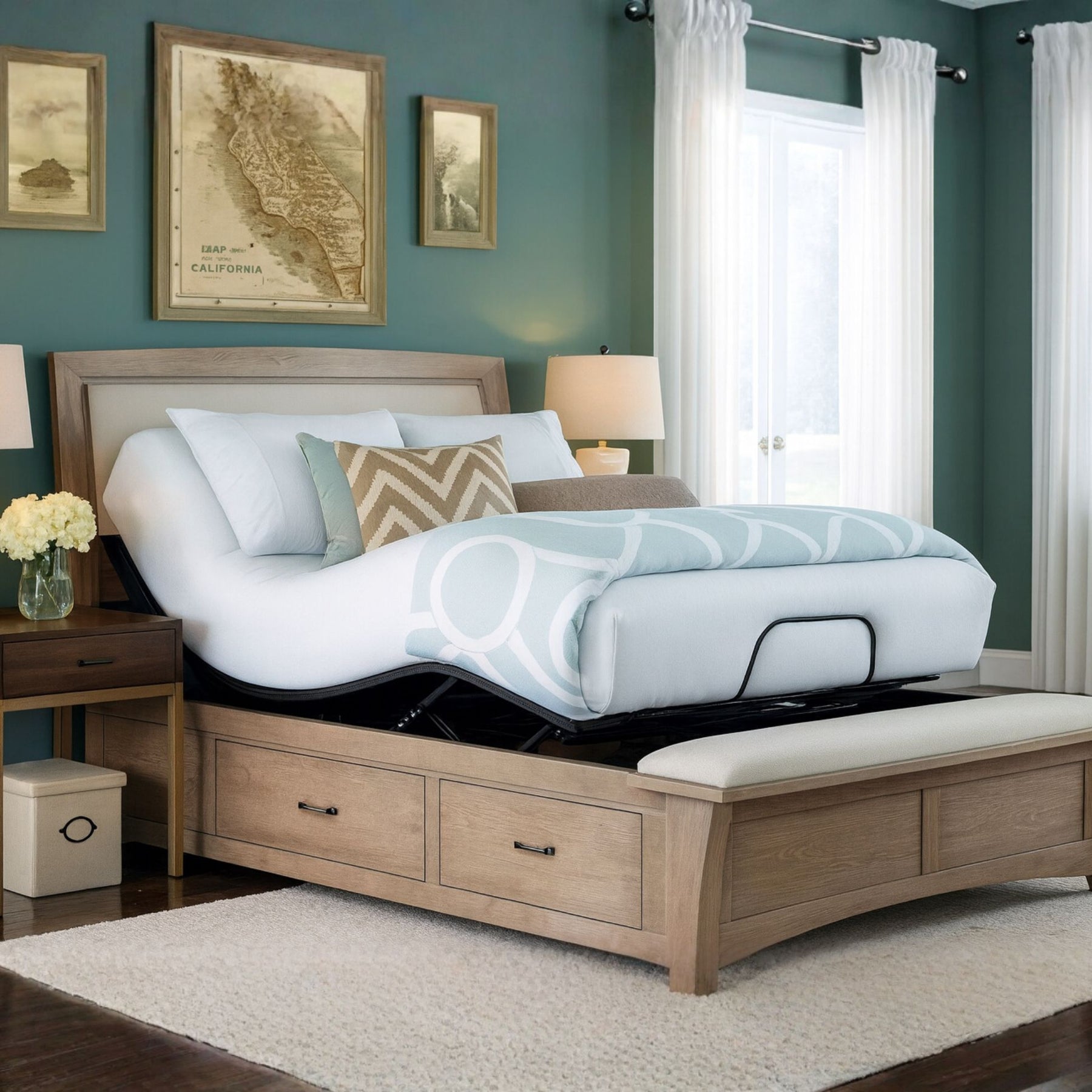Are you lying awake in pain from the very thing that's supposed to bring you comfort? Is your mattress the culprit of your aching back? You might be surprised to learn that an uncomfortable, unclean, or even worn-out mattress might be the cause of your back pain. How can you tell if your mattress is causing your back pain? And what do you do if it is? Could a number bed alternative work for you? Find out below!
We'll start off by discussing a few potential causes of back pain and how it may be linked to your mattress. Then, we'll discuss how to tell if your mattress is the culprit and what you can do to get a better night's sleep. So don't suffer in silence another night. Take action now and find out if your mattress is causing your back pain.
Quick Insight into Key Points
Yes, a mattress without adequate support can cause or worsen existing back pain. It is important to choose the right mattress for your body type and sleeping habits to ensure you get adequate support and restful sleep.
Why May a Mattress Cause Back Pain?
There are many different causes and types of back pain, but one is sleeping on an unsupportive mattress. Many people don't realize how a mattress can affect their back, but there are several ways an uncomfortable mattress can lead to ongoing back pain. It is important to understand why a mattress may cause back pain and how to prevent it in order to ensure a good night's sleep.
The primary reason why a mattress may cause back pain is that it doesn't provide adequate support for the curves of the spine. If the mattress is too soft, it won’t properly support the spine or hips, leading to neck and back pain. A too-firm mattress can also be the culprit; the lack of cushioning means there isn’t enough give to support your body or contour to your curves. An inappropriate size can be an issue as well; if you’re too small or large for your bed, your spine won’t get the optimal support it requires.
On the other hand, some argue that mattresses don't play a major role in back health as people will have recurring discomfort regardless of what type of mattress they sleep on. This could be a sign that their back pain is rooted in other causes rather than their mattress. Moreover, some may find particular comfort in an otherwise unsuitable mattress for others. Ultimately, it depends on a person's unique needs and preferences when it comes to mattresses. Which mattress works best for you will be an individual decision.
It is clear that mattresses may cause back pain, but which type of mattress is best for alleviating this issue? The answer lies in understanding your individual sleeping and firmness preferences. In the next section, we will explore these elements in more detail and discuss how they affect your overall comfort level and potential for neck or back pain.
- A study published in 2020 found that poor posture and inadequate support from a mattress are the leading causes of back pain.
- About 80% of adults experience lower back pain at least once in their life, with 38% reporting aggravation related to a mattress.
- Back pain is significantly relieved by appropriate levels of comfort support and sleeping posture. A medium firm mattress is recommended for individuals who suffer from back pain. However, it must be noted that “medium-firm” is a subjective term and often difficult to determine.
Your Sleeping Position and Mattress Firmness
When it comes to your sleeping position and mattress firmness, there are a few factors to consider. Sleep experts often recommend finding a mattress that works with your specific body shape, size, and preferred sleeping position. For example, if you tend to sleep on your back, you may find that a medium-firm mattress is the best choice as it can provide pressure-relief for your back and hips. On the other hand, if you mainly sleep on your side, a medium mattress might be more suitable as it will provide extra cushioning for the curves of your body. Although, it is important to note that most people move multiple times into different positions throughout the night.
There is some debate as to whether a memory foam mattress is the best for all different kinds of sleepers. A memory foam mattress may be an ideal choice for those who suffer from back pain regardless of their sleeping position - the extra cushioning helps promote good spinal alignment and relieves pressure points throughout the night. However, there are some conflicting opinions about whether traditional innerspring mattresses or memory foam mattresses are more suitable when it comes to helping ease back pain. While some believe innerspring mattresses can be too unyielding for individuals with lower back issues, others find them to be supportive enough without sacrificing comfort. Ultimately, deciding which type of mattress is best suited for your needs requires personal assessment.
No matter what sleeping position you prefer or what kind of mattress you choose, make sure it provides enough support for your back and provides pressure-relief to areas such as the back, hips, and shoulders. That way, you’ll wake up feeling refreshed and free from pain.
The next section addresses "How to Choose a Mattress for Back Pain Relief". If chosen correctly, a new mattress could eliminate the pain caused by an old one and allow users to relax more easily at night.
How to Choose a Mattress for Back Pain Relief
When selecting a mattress for back pain relief, it is important to consider support, pressure relief and comfort for your body. The right mattress should be able to provide support without creating any additional pressure or tension that could exacerbate existing aches and pains.
When considering a mattress option, many people look solely at the level of support it provides. However, it is often just as important to find a mattress that offers a comfortable sleeping surface. Mattresses that are too firm may put excess strain on joints and areas of the body which can increase back pain. Conversely, mattresses that are too soft can lack the necessary support needed by the spine, resulting in increased tension and discomfort throughout the night.
In order to find an ideal mattress option for your back pain relief needs, it’s important to consider both comfort, pressure-relief and support. If you need extra cushioning in certain areas of your body due to pre-existing aches or pains, you may want to opt for a mattress that has some give for neck, head and shoulder areas while still providing adequate lumbar support. When shopping for a new mattress, try out multiple options to find which one offers both the cushioning and support needed for your body type. The best way to try a mattress is to sleep on it, because this is when your muscles fully relax into the support (or lack of support) provided by the mattress.
The next step in finding an ideal mattress for back pain relief is understanding how much support your body needs and the type of material that can best help alleviate discomfort. Different materials offer different levels of support, so it's important to determine which ones will meet your lifestyle needs before making any purchasing decisions. From standard foam and spring mattresses to more specialized designs such as gel memory foam or hybrid mattresses, knowing which materials will provide optimal comfort and help in reducing existing back pains can make all the difference in finding the right sleeping solution.
Now that we have discussed how to choose a mattress for back pain relief, let's move on to discuss what type of support and comfort is right for your body.
The Right Support and Comfort for Your Body
Finding the right mattress for you can play a huge role in improving your overall back health, as having the correct support and comfort for your body is essential. An uncomfortable or low-quality mattress can lead to some serious issues over time. The right mattress should be able to help ease existing aches and pains and also prevent them from appearing altogether.
When it comes to finding a mattress that offers the right balance of support and comfort, there is no one-size-fits-all answer. This is because each person has different needs in terms of the kind of feel and support they require for optimum sleep and spinal health.
The debate between firmness and softness can be confusing, with some people believing that firm mattresses are better as they offer more support while others claim that softer mattresses are more comfortable and may even reduce back pain. While there is no definitive answer as to which is best for everyone, research has shown that medium mattresses are typically most beneficial for those suffering from back pain since they provide the right combination of both support and comfort. But it is important to note that what feels like medium-firmness to one person may not feel medium to someone else.
Ultimately, the ideal mattress will vary greatly depending on an individual’s needs but in general it's important to look for something that offers good pressure point relief while still providing plenty of spinal support. Choosing a mattress company that offers risk-free, at-home trials is your best option because that will enable you to test the mattress for at least two weeks to determine whether it is supportive enough.
So now we know why finding the right support and comfort is essential when it comes to picking out a mattress – let’s move onto exploring what types of mattresses are available.
Mattress Types and Quality
When trying to figure out if your mattress is causing your back pain, it’s important to understand the type and quality of the mattress you are sleeping on. Mattresses come in a variety of types, including traditional innerspring mattresses, memory foam mattresses, hybrid mattresses, and airbeds.
Innerspring mattresses have been the most common type of mattress for decades.They are considered the most “traditional” mattress type in the U.S. They are made with layers of springs or coils that are individually wrapped in fabric and foam layers for comfort. While innerspring mattresses used to be praised for their comfortable feel and durability, some now suggest that memory foam mattresses may be better for your spine health because they conform more closely to the body’s natural curves.
Memory foam mattresses are made from polyurethane foam and other elements that provide a contouring effect when pressure is applied. This can help reduce pressure points and allow for more even pressure-distribution across the body. Memory foam mattresses usually last longer than inner-spring mattresses, depending upon the quality of the materials. This can make them an attractive option for those looking for a long-lasting mattress that won’t break the bank. However, it is important to note that you will want to find a memory foam mattress that is made with cooling technology built in. iSense Classic mattresses are made with premium, open-cell foam which is some of the most breathable foam on the market. This helps to ensure that the foam redistributes heat throughout the night.
Hybrid mattresses are very popular right now. They offer another option that combines various materials such as layered memory foam, latex foam, and coils to provide both support and cushioning. Hybrid mattresses are generally more expensive than traditional innerspring or memory foam models but may offer superior comfort features such as targeted temperature control, zoned support systems, or even integrated massage technology. It is important to consider the materials in the hybrid mattress because they can be very different in the number of layers, type of foam and coils, etc.
Device airbeds are a newer type of mattress often featuring built-in controlled air chambers that actually adjust the firmness level of the bed based on user preferences. Number beds are one type of this mattress.
There are also adjustable firmness mattresses on the market, such as those built by iSense. iSense beds combine the best of foam, coils and small air chambers to offer twenty different firmness settings on each side of the bed. These beds reach higher levels of firmness than traditional hybrid models due to their advanced design and construction.
At the end of the day, choosing a good quality mattress comes down to personal preference and budget constraints – but with so many options available it’s easy to find one that meets both criteria. Now let's look at how long your chosen mattress should last before it must be replaced so you can continue getting a restful night's sleep without back pain problems.
How Long Do Mattresses Last?
Many people often wonder how long their mattress should last before needing to be replaced. The truth is, it varies depending on factors like the type and quality of mattress and your bed-maintenance habits. While some mattresses last as short as five years, other types are said to last up to 8-10 years or longer. The average tends to be 7-8 years.
When it comes to mattress durability, higher end mattresses should be made with premium, high-quality materials. If a mattress has a higher coil count, memory foam feel, and quality materials, it may last longer than lower quality versions. However, these mattresses tend to be more expensive than others. Lower quality mattresses which are typically cheaper can also last for several years, although they may sag and compress sooner than higher-quality brands.
Proper maintenance plays an important role in the lifespan of a mattress. An easy way to keep your mattress clean is to invest in a high-quality, antimicrobial mattress cover. This will help reduce stains and the presence of mites and other allergens. Some say you need to flip or rotate your mattress regularly, but this is not the case with all mattresses. Lower-quality memory foam mattresses may develop an indentation of your body, which is why some suggest flipping or turning it. However, mattresses such as those made by iSense do not need to be flipped or turned. Most importantly, investing in quality bedding such as high-quality sheets and pillow protectors can further extend the life of your bedding by providing an extra layer of protection against dust mites and spills.
No matter what quality of mattress you have and how often you use it, having an understanding of when it’s time to replace the mattress is key. If your mattress:
- Shows signs of weakness such as sagging or bumps instead of the original shape
- If you wake up with frequent aches and pains that don’t seem to go away (even after adjusting sleeping posture)
- Or if your mattress is 7-8+ years old – these are all good indicators that it might be time for a new one.
Now that you know how long mattresses should generally last and why proper maintenance is so important for longevity and back pain relief, let's move on to discuss how to maintain your mattress for optimal back pain relief in the next section.
How to Maintain Your Mattress for Optimal Back Pain Relief
Maintaining the quality of your mattress is key to keeping mattress-caused back pain away. A few simple tips and tricks can help you make sure your mattress is offering the optimal level of support for your body.
First and foremost, depending upon your mattress, you might need to rotate it every few months in order to avoid premature sagging or uneven wear. This also applies for memory foam mattresses—moving them around will help break up lumps or bumps which could cause discomfort and eventually lead to back pain. Additionally, seriously consider getting a high-quality mattress protector to be help keep the mattress clean and fresh.
It’s also a good idea to vacuum your mattress frequently; this not only helps rid it of dust mites, but it also opens up the upholstery layers so it can properly breathe. It’s recommended that you vacuum once every six months, or even more often if you suffer from asthma or allergies. Finally, be mindful about how many people are sleeping on the bed; no matter how comfortable a mattress may be, weight and size still matters when it comes to its longevity and performance. Ultimately, when a mattress isn’t able to adequately support two adults at once, it will quickly begin sagging and leave you with achy joints.
Ultimately, when equipped with the right knowledge and maintenance tips, you can ensure that your mattress offers the correct support necessary for long lasting back pain relief. By following these guidelines and committing yourself to maintaining the quality of your mattress over its lifespan, you can come one step closer in finding sustainable comfort and support night after night.
Conclusion and overall summary: The maintenance habits of your mattress are essential in obtaining optimal back pain relief. Fortunately, with some simple tips and tricks as well as regular maintenance routines, you can maintain the quality of your mattress for sustainable comfort and support down the line. In this next section we will discuss reaching a conclusion about whether or not your mattress may be causing your back pain.
Conclusion and Overall Summary
When considering whether or not a mattress is causing back pain, it’s important to know that it is difficult to make a general assumption. Ultimately, what matters is how the individual responds to their sleeping environment and if they feel like their mattress is contributing to their pain, it may be worth looking into alternatives A person should consider if their mattress is providing enough support for their spine, as well as considering other lifestyle factors such as exercise, diet and stress levels.
When choosing a new mattress, it’s important to evaluate factors such as the amount of cushioning, pressure-relief and support provided. You can also consider the size and shape of the bed frame and any additional features such as cooling elements or special materials which can help with pressure relief. Additionally, many companies allow people to trial their mattresses for a few weeks before committing to a purchase. This can help individuals sleep on the mattress to determine what works best for them without committing for the long-term.
Overall, while mattresses can have an impact on a person’s sleep-associated pain issues, other factors need to be taken into consideration too. People should take time to assess not only their mattress but all aspects of their sleeping environment when trying to manage any back-related issues. Consulting with a qualified medical professional is also recommended if symptoms don’t go away despite attempting lifestyle changes.
Top Highlights
When deciding whether or not a mattress is causing back pain, it's important to understand that the effects of mattresses on back conditions are still being debated. People should evaluate their mattress and any other lifestyle factors such as exercise, diet, and stress levels when trying to manage chronic back issues. When selecting a new mattress, individuals should take into account characteristics like cushioning and support, pressure-relief, and features like cooling elements. People should also consider testing out a mattress for a few weeks before making a purchase. Consulting with a qualified medical professional is advised if symptoms do not improve despite lifestyle changes.
Answers to Frequently Asked Questions with Explanations
How can I tell if my mattress is causing me back pain?
The best way to tell if your mattress is causing you back pain is to notice whether you go to sleep without pain and wake up with back pain. It can also help to observe how you sleep. Do you wake up with an achy back? Do you find yourself tossing and turning because of discomfort? These are all signs that your mattress might be holding you back from achieving quality restful sleep. Additionally, consider how your role preferences have changed over time. Have you had to move around more often than usual looking for more comfortable positions? If so, chances are that your mattress is causing excessive discomfort and should be replaced.
Are there specific types of mattresses that are more likely to contribute to back pain?
Yes, there are certain types of mattresses that can contribute to back pain. Those with inadequate support, such as a too-soft mattress may cause strain on your vertebral discs and the muscles, tendons, and ligaments of your back. Additionally, mattresses that have become worn out or sagging over time can cause body misalignment which can pull on your spine and cause back problems. It's best to avoid anything that is excessively firm, stiff, or lumpy as this can also contribute to discomfort in the neck and back. Your mattress should be able to provide enough support while simultaneously being comfortable to ensure good spinal health.
What steps should I take to ensure I'm buying a mattress that won't cause me back pain?
When it comes to finding a mattress that won’t cause you back pain, there are several steps you should take to ensure your purchase is the right one for you.
First, consider what type of mattress works best for your body. Different types of mattresses offer various levels of support and comfort, so consider what type and size you need for optimal results.
Next, look into the construction materials used in the mattress. You want to find a mattress that is constructed with premium, high-quality materials.
Finally, make sure to try out the mattress before you buy it. Doing this gives you an opportunity to evaluate how comfortable it is for your body, as well as how much support it provides. If possible, you want to purchase a mattress from a company that offers risk-free, at-home trials that last at least 30 days, to provide enough time for your body to adjust.
By following these steps when selecting a new mattress, you will be able to find the one that offers the most support and comfort without causing unnecessary back pain.
iSense mattresses are built with twenty comfort settings on each side of the mattress. You will find pressure-relief at every setting, so you never have to sacrifice support for comfort.






















